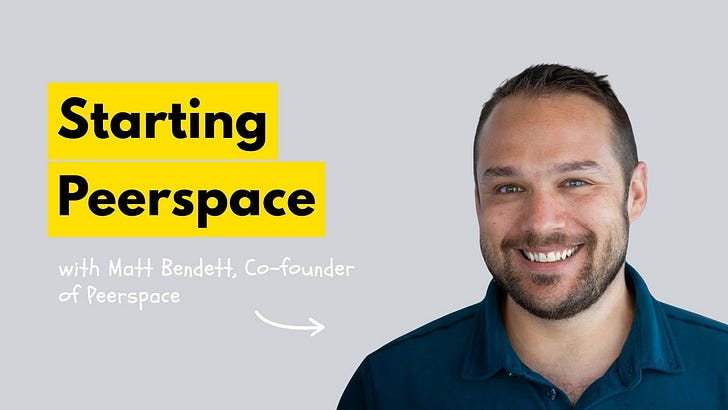🛖Space to Grow: How Peerspace Became the Airbnb of Unique Venues🪴
Lessons in marketplace mastery from Matt Bennett, founder of Peerspace, on building trust, empowering hosts, and creating a community-driven platform for unforgettable experiences.
Hi there, Welcome to our new readers since last Friday, joining our community of business nerds.
Every Friday we share episodes from interesting channels you can check out on YouTube.
Imagine you're a photographer, and your client wants a photoshoot location that screams, “We have taste and budget.” Your options? Either get creative with public spaces (and risk curious pedestrians in the background) or book a top-tier space that looks like it’s straight out of a design magazine. Enter Peerspace, the “Airbnb for experiences,” where unique venues are just a click away.
In the latest episode of Everything Marketplaces, Peerspace founder Matt Bennett shares his behind-the-scenes playbook for building a marketplace that fills an unserved niche and consistently brings in the bacon. Here’s what stood out, plus a few takeaways that might just shift how you think about marketplaces.
1. Find the Gaps Before the Trend Goes Mainstream
Remember when coworking spaces started popping up? Bennett was on that train early but soon realized that beyond coworking, there was a demand for all kinds of rentable spaces studios, private homes, art galleries, you name it. From intimate gatherings to large corporate off-sites, Peerspace became a go-to for renting unique locations.
Lesson: Don't just look at what's trendy. Look at what the trend is missing. Bennett saw that spaces were limited to either residential or corporate, but the desire for experiential venues was untapped.
2. Building Trust on Both Sides of the Marketplace
A marketplace lives or dies on trust. With Peerspace, the challenge was convincing space owners that lending out their properties wouldn't lead to “party cleanup mode” every week. Meanwhile, renters needed to feel assured that the space they booked wouldn’t look like a post-party mess.
Peerspace tackled this with two key tactics: strong community standards and verified reviews. This way, hosts could be comfortable about who was coming in, and users could avoid “fancy photos, but the fridge doesn’t work” situations.
Takeaway: If you're launching a marketplace, double down on transparent community standards. Give both sides of the table visibility and reliability and make it more than just lip service.
3. Nail Down Niche Marketing
Unlike Airbnb or Uber, where there's broad consumer interest, Peerspace had to dive deep into niche marketing. Bennett and his team targeted professionals who needed creative spaces: photographers, filmmakers, event planners, and companies hosting retreats. They didn’t waste marketing dollars trying to appeal to everyone.
Key Insight: When Bennett talks marketing, it’s like a masterclass in narrowcasting. Instead of a mass-market shotgun approach, Peerspace adopted a laser focus. This precision targeting helped the platform connect deeply with a core audience, leading to quicker adoption and stickier user engagement.
4. Empowering Hosts to Make Bank
Unlike the classic hotel model, Peerspace empowered hosts to set their own rates, availability, and guidelines for renters. This freedom gave them ownership over the booking experience. Bennett understood that for a marketplace to thrive, its providers need to feel like partners, not just service cogs.
Hosts were encouraged to “be their own bosses,” and the payoff? An incentivized host network that felt committed to the platform’s success. Bennett’s approach highlights how treating your suppliers as partners can create advocates who’ll stick around for the long haul.
Why it matters: Marketplace loyalty doesn’t come from perks alone. It’s about empowering providers with control and clear incentives. Whether you’re building a freelance gig platform or a bookable space marketplace, give your providers room to define their own experience.
5. The Future of Experiential Rentals is Just Getting Started
In a post-pandemic world, people are hungry for experiences that go beyond the usual walls of home or office. Peerspace’s model isn’t just a marketplace it’s part of a larger shift where people want to create, connect, and celebrate in places with personality.
The Play Here: Think about where you want your marketplace to go long-term. Bennett has hinted at plans for expansion and even new verticals. By creating the infrastructure for booking spaces, Peerspace is poised to pivot and adapt as the demand for unique experiences grows.
Final Thoughts: Marketplace Mastery
Matt Bennett’s journey with Peerspace offers a blueprint for anyone eyeing the marketplace model. From finding niche demand to building trust and empowering partners, Peerspace has proven that sometimes the best business ideas are the ones that connect people in unexpected ways.
Closing Tip: When building your own marketplace, don’t aim to just solve a problem aim to create a movement. As Bennett shows, a marketplace with a sense of purpose doesn’t just attract users; it builds a community.
Watch the full episode here ⬇️




